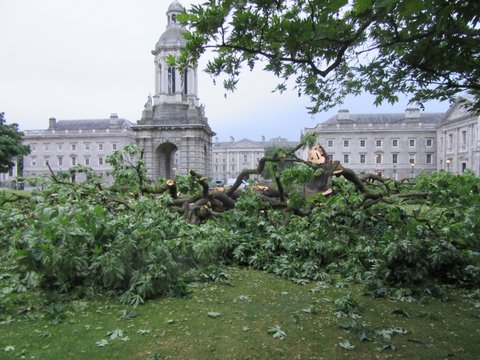Recent warm weather may have played role in collapse of iconic Trinity tree

June 6th, 2018
The recent rise in temperature may have influenced the collapse of an iconic 170-year old tree in Trinity College Dublin (TCD) last weekend, a University expert has said.
The iconic Oregon Maple that stood in Library Square for almost two centuries fell at about 2.45am last Saturday morning. No one was injured in the incident and there was no damage to the surrounding buildings.
The tree was a popular backdrop for photographs of many graduating students and is likely to have had TCD alumni such as Samuel Beckett, Bram Stoker and Mary Robinson pass beneath its branches.
The chair of the University’s Grounds and Gardens Advisory Committee, Professor John Parnell, told Trinity students this week that they “simply do not know, and probably will never know” why the tree collapsed over the weekend.
In an email seen by The Green News, the Professor of Systematic Botany said that the collapse may have been due to the recent rise in temperature that could have caused “exceptional physiological and physical stress” for a tree that was “not in tip-top condition”.
According to Prof Parnell, the trees on Trinity College grounds are regularly assessed for safety. The latest tree survey carried out in April 2018 indicated that there were concerns about the condition of all three Oregon Maples on campus.
He added, however, that it was not believed that any trees were in immediate danger of collapse. “Indeed, it was hoped the life of the Maples in Library Square might, possibly, be prolonged through remedial works, including lightening of the crown of the trees,” he said.
Tons of timber from the tree has since been collected and stored away for future use, Prof Parnell added, commending the work of campus service staff for their “exceptionally hard work”.
Both of the remaining Oregon Maple trees have been declared as compromised following their assessment in April, Prof Parnell added.
The lifespan of the Maple in the University’s New Square is predicted to come to an end in the coming years and is now set to be removed for safety reasons.
Really sad. Loved that tree https://t.co/IkNn2wQTTR
— Leo Varadkar (@campaignforleo) June 3, 2018
A scan of the tree earlier this year revealed that only one-third of the tree is solid wood, while the remaining two-thirds consists of damaged wood caused by wood-decaying fungi.
Two replacement trees – an Irish Sessile Oak (Quercus petraea) from Killarney and a Beech (Fagus sylvatica) – were planted in the area a number of years ago and will grow to take the Maple’s place.
Remedial works are due to be carried out on the third Oregon Maple tree located next to TCD’s Long Room in an effort to prolong its life.
“These works include lightening the canopy through highly selective removal of over-dense parts of the canopy (undertaken this weekend), treatment of the roots and some of the limbs with a mixture of fungicide and nutrient solution,” Prof Parnell said.
[x_author title=”About the Author”]








